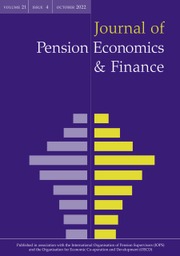Persistency of pension contributions in the UK: evidence from the British Household Panel Survey
Published online by Cambridge University Press: 23 August 2006
Abstract
This paper presents evidence from the British Household Panel Survey (BHPS) on the persistency of contributions to individual, private pensions. The BHPS contains a wealth of information on individuals' socio-economic and demographic characteristics, allowing detailed analysis of how individual circumstances – and changes in those circumstances – can affect whether or not someone continues to contribute. The paper finds variation in persistency rates by gender, earnings, and household income. As might be expected, changes in income and consumption needs (for example, becoming unemployed or the arrival of a new baby) increase the probability of lapse, but, conditional on these changes, the level of household income also matters, suggesting that pensions may be less affordable for those on low incomes, even in the absence of shocks.
- Type
- Research Article
- Information
- Copyright
- 2006 Cambridge University Press
Footnotes
- 2
- Cited by


